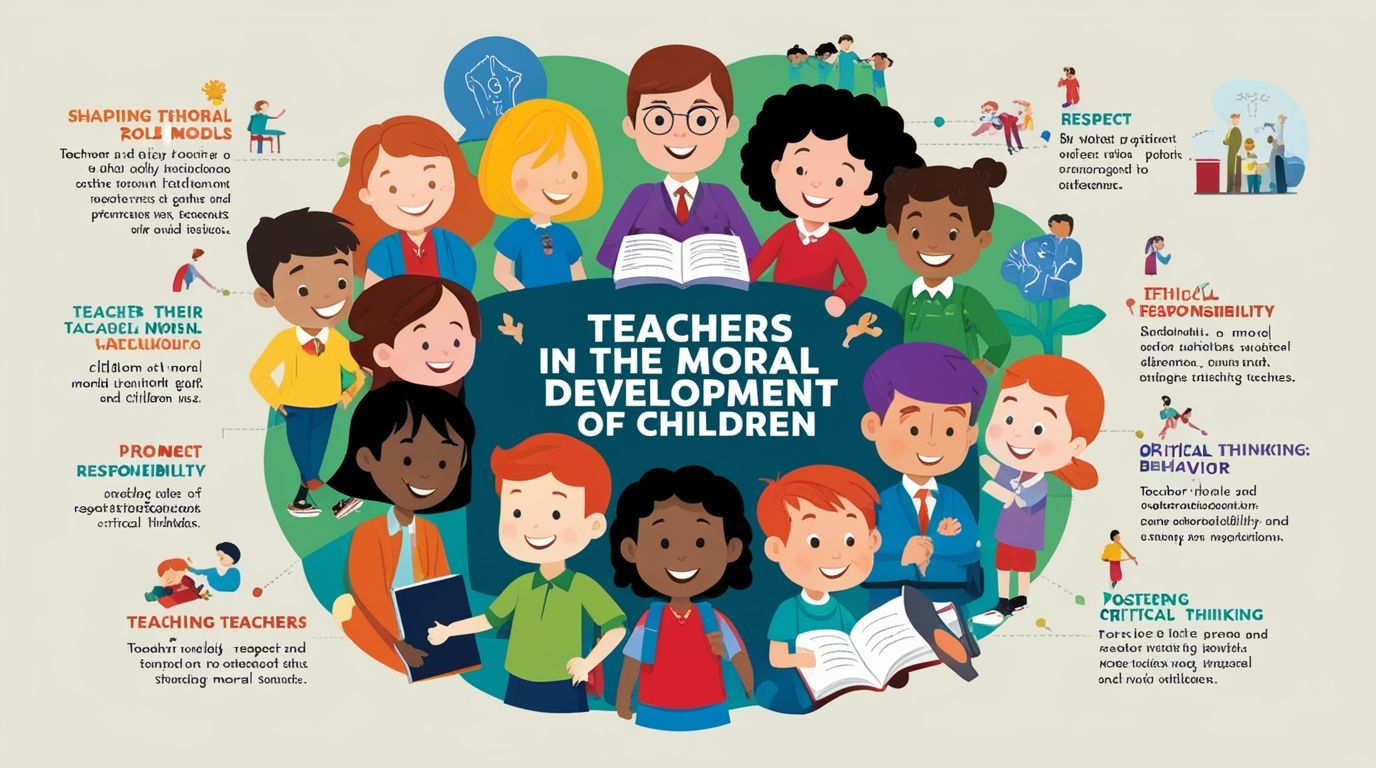The Role of Teachers in the Moral Development of Children, The moral development of children is a crucial aspect of their overall growth and character formation. While parents are often seen as the primary influencers in shaping a child’s moral values, teachers play an equally important, if not more consistent, role in guiding children’s moral development, especially during their formative school years. Teachers, by virtue of their position in children’s daily lives, are not only facilitators of academic knowledge but also models of moral behavior, values, and ethics. This article delves into the key roles teachers play in nurturing the moral development of children, discussing the strategies and responsibilities they carry in fostering ethical growth and sound character.
1. Teachers as Moral Exemplars
One of the most significant roles teachers play in moral development is leading by example. Children, especially younger ones, are highly impressionable and often look up to their teachers as role models. The way teachers behave, interact with students, and handle everyday situations in the classroom leaves a lasting impression on students’ moral understanding.
Key Points:
- Modeling Ethical Behavior: Teachers who demonstrate integrity, fairness, kindness, and respect help instill these values in their students. Children learn to mimic these behaviors, internalizing them as part of their own moral framework.
- Consistency in Actions: A teacher’s consistency in following through on their promises and showing fairness in their dealings with students reinforces the importance of trustworthiness and justice.
- Respect for Diversity: Teachers who respect and celebrate diversity in the classroom encourage students to be inclusive, tolerant, and respectful toward others, regardless of their background, culture, or beliefs.
By embodying positive moral behaviors, teachers can have a profound and lasting influence on their students, helping them understand the importance of ethics and morality in everyday interactions.
2. Teaching Moral Values through Curriculum and Instruction
In addition to modeling good behavior, teachers play a vital role in explicitly teaching moral values through the curriculum and classroom activities. While subjects like mathematics and science focus on cognitive skills, other subjects such as literature, social studies, and even classroom discussions provide opportunities to introduce and reflect upon moral issues.
Key Strategies:
- Literature and Storytelling: Books, stories, and historical events are rich with moral lessons. Teachers can use literature to discuss themes such as honesty, courage, compassion, and justice. For example, reading a story about a character who faces a moral dilemma can spark discussions on making ethical decisions.
- Classroom Discussions on Ethical Issues: Encouraging open dialogue about current events or moral questions helps students think critically about right and wrong. Teachers can guide these conversations, ensuring students understand the complexity of moral choices while encouraging empathy and perspective-taking.
- Incorporating Ethical Scenarios: Teachers can use case studies or hypothetical situations where students must make a choice and justify their reasoning. This helps students practice moral reasoning and develop a deeper understanding of ethical principles.
- Character Education Programs: Many schools incorporate formal character education programs that focus on teaching core moral values such as respect, responsibility, fairness, and citizenship. Teachers are often tasked with delivering these lessons and integrating them into daily classroom activities.
By incorporating moral discussions and lessons into their teaching, educators help students learn to apply ethical principles in real-life situations.
3. Fostering Empathy and Emotional Intelligence
Moral development is not just about understanding abstract ethical principles but also about fostering empathy and emotional intelligence. A person’s ability to recognize, understand, and respond to the emotions of others is central to making ethical decisions and developing a strong moral compass.
How Teachers Foster Empathy:
- Building Emotional Awareness: Teachers can help students recognize and label their emotions, as well as the emotions of others. Understanding how actions affect others emotionally helps students develop empathy, which is a key component of moral behavior.
- Encouraging Cooperative Learning: Group work and collaborative projects provide opportunities for students to work together, navigate differences, and resolve conflicts in a way that fosters mutual respect and understanding.
- Creating a Safe, Supportive Classroom Environment: When students feel emotionally safe and supported, they are more likely to be empathetic and compassionate toward others. Teachers who promote kindness and respect in the classroom environment help nurture these qualities in their students.
- Conflict Resolution and Mediation: Teachers play an important role in teaching students how to resolve conflicts peacefully and fairly. By mediating disputes and guiding students through the process of resolving disagreements, teachers instill values such as fairness, justice, and empathy.
Teachers who prioritize emotional learning and empathy-building equip their students with the tools they need to navigate moral challenges and treat others with kindness and understanding.
4. Reinforcing Positive Behavior through Classroom Management
Classroom management plays a critical role in moral development because it sets the boundaries and expectations for behavior. Teachers, through their classroom management strategies, reinforce what is acceptable and unacceptable behavior, thus shaping students’ moral actions.
Important Elements of Classroom Management in Moral Development:
- Setting Clear Expectations: When teachers clearly define rules and expectations for behavior, they establish a moral framework for the classroom. Students learn the importance of adhering to rules not just for the sake of compliance, but because these rules reflect broader ethical principles such as respect, fairness, and responsibility.
- Positive Reinforcement: Recognizing and rewarding positive behavior encourages students to repeat those actions. For example, praising a student for helping a peer or acknowledging acts of kindness can motivate others to engage in similar behavior.
- Consequences for Negative Behavior: On the other hand, addressing negative behaviors such as lying, cheating, or bullying teaches students about accountability and the consequences of immoral actions. Teachers should focus not just on punishment but on helping students understand why their behavior was wrong and how they can make amends.
- Restorative Practices: Restorative practices in the classroom emphasize healing and making things right after a conflict or wrongdoing. Instead of traditional punitive measures, teachers may use restorative circles or discussions that allow students to reflect on their behavior, understand its impact on others, and take responsibility for their actions.
Through thoughtful classroom management, teachers help students understand the importance of moral conduct and encourage the development of good character.

5. Promoting Critical Thinking and Moral Reasoning
Moral development requires more than just following rules—it involves critical thinking and the ability to reason through ethical dilemmas. Teachers can play an important role in helping students develop these skills by encouraging them to think deeply about moral questions and challenging them to justify their ethical decisions.
Encouraging Critical Moral Thinking:
- Ethical Dilemmas: Presenting students with moral dilemmas that have no clear right or wrong answers encourages them to engage in moral reasoning. Teachers can guide students in considering multiple perspectives and the potential consequences of different actions.
- Socratic Method: Using the Socratic method, where teachers ask probing questions rather than providing answers, helps students develop their own moral reasoning abilities. By questioning their assumptions and examining their values, students can develop a more sophisticated understanding of morality.
- Debate and Discussion: Engaging students in debates on moral issues helps them articulate their views, listen to opposing opinions, and reconsider their own ethical positions in light of new information.
By encouraging students to think critically about morality, teachers help them develop the intellectual tools necessary for making ethical decisions throughout their lives.
6. The Teacher’s Role in Community and Citizenship
Teachers also play an essential role in helping students understand their responsibilities as members of a broader community and society. Civic education, which teaches students about their rights and responsibilities as citizens, is deeply connected to moral development.
Key Contributions to Civic and Moral Development:
- Service Learning and Community Engagement: Teachers can involve students in service-learning projects that encourage them to apply their moral values in real-world settings. This fosters a sense of responsibility, compassion, and commitment to the common good.
- Teaching about Justice and Fairness: Discussing social justice issues, human rights, and fairness helps students understand their role in advocating for equity and ethical practices within their communities and beyond.
- Encouraging Active Citizenship: Teachers can inspire students to be active, ethical participants in their communities by encouraging volunteerism, leadership roles, and participation in democratic processes.
Through these efforts, teachers help students develop a sense of moral responsibility toward their communities and the world.
Conclusion
Teachers play a pivotal role in the moral development of children, influencing their ethical behavior through example, curriculum, classroom management, and fostering empathy and critical thinking. By helping students develop a strong moral foundation, teachers prepare them to become responsible, compassionate, and ethical individuals capable of making positive contributions to society. The impact of teachers in this regard extends far beyond the classroom, shaping the future moral compass of generations to come.
References:
- Berkowitz, M. W., & Bier, M. C. (2005). What Works in Character Education. Journal of Research in Character Education.
- Lickona, T. (1991). Educating for Character: How Our Schools Can Teach Respect and Responsibility. Bantam.
- Narvaez, D. (2006). Integrative Ethical Education. Educational Psychologist.
- Noddings, N. (2002). Educating Moral People. Teachers College Press.

12 thoughts on “The Role of Teachers in the Moral Development of Children”
Comments are closed.